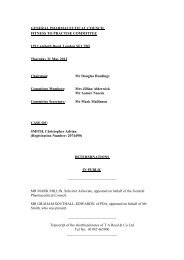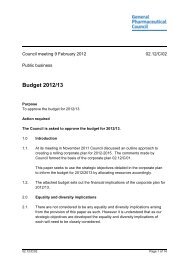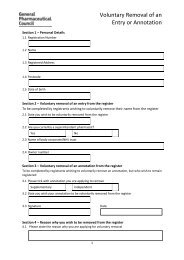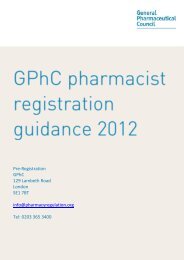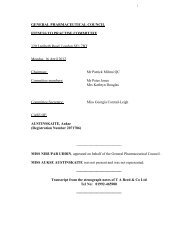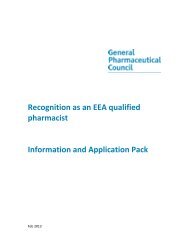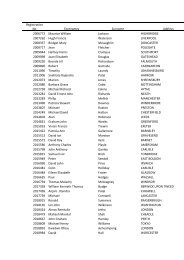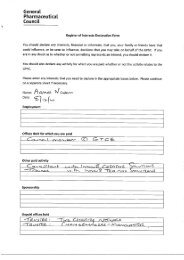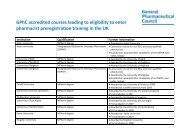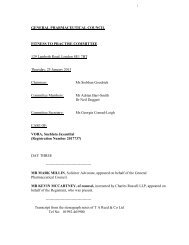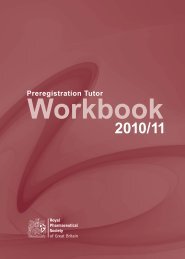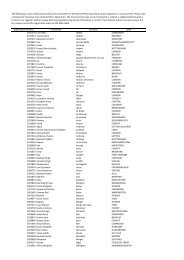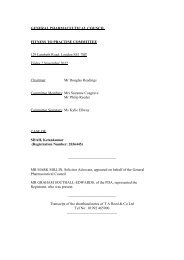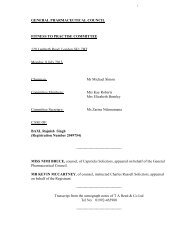Regula+e - General Pharmaceutical Council
Regula+e - General Pharmaceutical Council
Regula+e - General Pharmaceutical Council
Create successful ePaper yourself
Turn your PDF publications into a flip-book with our unique Google optimized e-Paper software.
Fitness to practise – learning<br />
Making false claims for<br />
MURs: Case one<br />
The fitness to practise committee heard<br />
allegations that a pharmacist had made<br />
false claims for Medicine Use Reviews<br />
(MURs) that had resulted in an<br />
overpayment of £22,000 to the pharmacy<br />
and a personal bonus to the pharmacist of<br />
£800. The false claims had occurred over a<br />
two-year period and his employer had<br />
been obliged to pay back the £22,000.<br />
The pharmacist had claimed for eight<br />
MURs per week, whether or not he had<br />
done them.<br />
The committee said the pharmacist’s<br />
evidence on how many MURs he had<br />
carried out was unclear and at times,<br />
contradictory. On the balance of<br />
probabilities, they said that approximately<br />
20 per cent had not been carried out at<br />
the time a claim was made.<br />
The pharmacist had also made no record<br />
on his employer’s computer system, as<br />
required by his employer.<br />
The committee said the pharmacist had<br />
treated the dishonest reporting and<br />
claiming of MURs as an insignificant matter<br />
and had denied his dishonesty up to a very<br />
late stage in the investigation, and it was<br />
“extremely concerned” about his apparent<br />
lack of insight into his misconduct.<br />
The committee accepted that the<br />
pharmacist had felt under pressure to<br />
achieve a target of 400 MURs a year, and<br />
that he had experienced some personal<br />
and family problems. There was also no<br />
evidence of any direct risk to patient safety.<br />
However, accuracy and honesty in recordkeeping<br />
was crucial to a pharmacist’s duty.<br />
The committee concluded that his<br />
conduct was not fundamentally<br />
incompatible with registration as a<br />
pharmacist but that a clear message<br />
needed to be sent out about the<br />
unacceptability of his behaviour.<br />
The pharmacist was suspended for 12<br />
months, with a review of the suspension<br />
by another panel of the fitness to practise<br />
committee before the end of that period.<br />
Making false claims for<br />
MURs: Case two<br />
The fitness to practise committee heard<br />
allegations that a pharmacist had<br />
submitted 308 claims for Medicines Use<br />
Reviews (MURs) over a four-month period<br />
which had not been carried out, and as a<br />
result of these claims, had received a<br />
personal bonus of £800.<br />
Over a four-month period, the pharmacist<br />
had claimed that she had completed a<br />
total of 400 MURS, but when asked by the<br />
company pharmacy manager to produce<br />
the documentary evidence, was unable to<br />
do so. There was no evidence she had<br />
done more than 92 MURs.<br />
The pharmacist had initially helped with<br />
the search for evidence that she had<br />
completed the MURs, then had admitted<br />
she had submitted inflated claims, and<br />
repaid the £800.<br />
The committee said the pharmacist<br />
had found herself out of her depth in<br />
fulfilling her responsibilities in her first<br />
non-locum role, and that she particularly<br />
wanted to impress her employers in the<br />
hope of being offered a permanent post.<br />
One way she had decided to do that was<br />
by completing a high number of MURs.<br />
She had accepted that she had acted in a<br />
dishonest manner and had breached the<br />
standards of conduct, ethics and<br />
performance which require pharmacists<br />
to make sure their professional<br />
judgement is not impaired by personal<br />
or commercial interest, incentives,<br />
targets or similar measures.<br />
In deciding on the outcome, the<br />
committee took into account the early<br />
repayment of the £800; that the events<br />
had taken place over a short period; that<br />
the pharmacist was not motivated by<br />
personal financial gain; and that there<br />
was no actual harm to patients or to the<br />
public. The pharmacist had shown<br />
insight by accepting her wrongdoing and<br />
showing remorse. She had no record of<br />
previous wrongdoings, and testimonials<br />
considered by the committee spoke<br />
highly of her care, kindness and<br />
professionalism.<br />
The committee said a lengthy<br />
suspension would be a disproportionate<br />
interruption to her career, and due to<br />
the insight shown, imposed a onemonth<br />
suspension.<br />
Learning points<br />
• You must always act with honesty<br />
and integrity<br />
• You must cooperate with<br />
investigations, acknowledge when<br />
your practice is inappropriate and<br />
reflect on how your practice<br />
should be improved or changed<br />
• You must not make claims for<br />
services that you have not carried<br />
out, even if you intend to carry<br />
them out in the near future<br />
• You must make necessary records,<br />
to show a clear audit trail of the<br />
services that you have carried out,<br />
and to comply with any<br />
requirements that may apply<br />
under your NHS contract<br />
• You must make sure that your<br />
professional judgement is not<br />
affected by having to achieve<br />
targets set in the course of your<br />
employment<br />
• If you feel under undue pressure<br />
to meet certain targets that have<br />
been set for you, you should raise<br />
this with your manager or<br />
superintendent pharmacist<br />
Upholding standards and public trust in pharmacy 19



